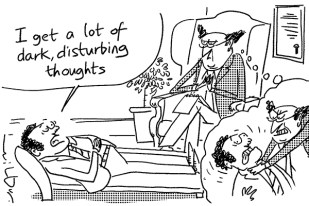John le Carré once wrote sadly that he felt ‘shifty’ about his contribution to the glamorisation of the spying business.
David Omand doesn’t deal in glamour. He was at the top of the Ministry of Defence and the Home Office, director of the code-braking Government Communications Headquarters, chairman of the Joint Intelligence Committee, and responsible for structuring the government’s current anti-terrorist organisation. He thinks and writes deeply about the intellectual and moral problems thrown up by a business that depends on stealing other people’s secrets. He knows what he is talking about.

How Spies Think is engagingly readable, even though the arguments are complex. It aims, ambitiously, ‘to empower ordinary people to take better decisions by learning how intelligence analysts think’. It is no use gathering secrets, even by the most ingenious means, Omand maintains, unless you can assemble them into a useful whole. It is the end product that matters, not the the adventures of the secret agents of fact and fiction — the Philbys, the Bonds, even the unglamorous Smileys. It is the intelligence analysts, boring people working in scruffy offices, who are the key to the whole business. It is they who put together the coherent picture on which — with luck —their bosses will base their decisions.
The analysts need accurate, reliable and timely information. But their raw material is rarely either plain or simple. More often it is incomplete, ambiguous and self-contradictory. Sometimes our spies on the ground are actually working for the other side and feed us information deliberately to mislead. Sometimes they are working for nobody but themselves, and invent stuff in order to attract reward. Omand explains how the analysts try to avoid the traps. And he issues two general warnings, from which the rest of us can indeed learn.
Our instinct is to believe what our group believes, and, alas, to tell our bosses what they want to hear
The first ought to be obvious. No one can foretell the future. The unexpected happens. Black swans fly in to upset our calculations. The intelligence agencies are brutally excoriated by the press and public whenever they fail to predict great events — the fall of the Shah of Iran in 1979, for example, or the collapse of the Soviet Union in 1991 and the future of Putin today. But in harsh reality the best they can do is to deal in probabilities, to pick out the most likely result, while warning their bosses of the others. And, like the rest of us, they can make dreadful mistakes. The Americans failed to pick up the signs that the Japanese were going to attack Pearl Harbor and that a bunch of terrorists were about to bring down the Twin Towers in New York.
The second trap is the biggest and most insidious. It catches us all. It is what Omand calls the ‘consensual hallucination’: our instinct to believe what our group believes, and — alas — to tell our bosses what they want to hear. That’s what shaped the misleading advice given to Blair and Bush before they launched their war against Iraq in 2003. It can be countered only by a rigorous inspection and understanding of our own weaknesses. It is some consolation that our opponents — the Russians and Chinese for example — are at least as prone to such weaknesses as we are: more vulnerable indeed, since the penalties for telling their bosses what they do not want to hear are usually much more severe.
All this raises inescapable ethical issues. Omand tackled them head-on in an earlier book, Principled Spying: The Ethics of Secret Intelligence (2017), written with Mark Pythian of Leicester University. Governments have always used persuasion, seduction, blackmail, bribery and deceit to persuade foreigners to betray their countries. They have always employed black propaganda, assassination and torture as weapons of secret war. Now modern technology enables them to eavesdrop at will on their people.
How much of this is morally justifiable or compatible with the requirements of a law-based society? All governments claim, with some justification, that it is necessary if they are to defend their country against foreigners, terrorists and criminals. Authoritarian governments use it without constraint to preserve their domestic power. Democracies are tempted to follow suit, even if it means stretching the law: ‘If they do it, we have to’.
But democracies do on the whole try to keep things under control. In Britain the supervisory powers of parliament and the courts have been much strengthened in recent decades. They can never be foolproof. They will not satisfy those who fear the secret state. They can be kept effective only by constant vigilance. The spying business is still being glamorised by a flood of well-crafted popular histories and enjoyably ingenious thrillers. But the growing body of serious writing by professionals such as Omand and others helps to demystify, illuminate and keep honest a profession around which fantasists have always buzzed like flies.






Comments